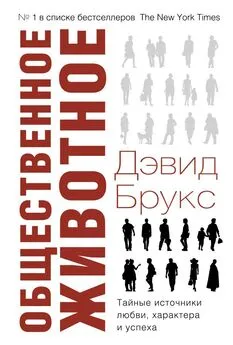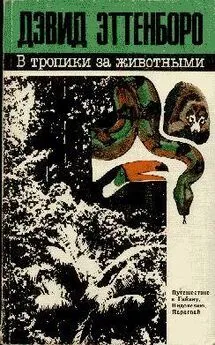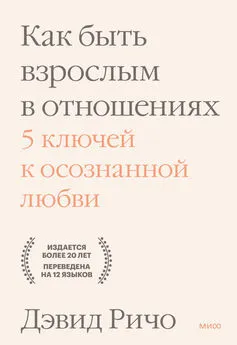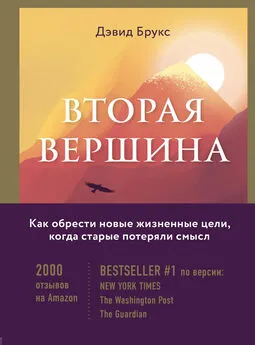Дэвид Брукс - Общественное животное. Тайные источники любви, характера и успеха
- Название:Общественное животное. Тайные источники любви, характера и успеха
- Автор:
- Жанр:
- Издательство:ACT
- Год:2013
- Город:Москва
- ISBN:978-5-17-080011-7
- Рейтинг:
- Избранное:Добавить в избранное
-
Отзывы:
-
Ваша оценка:
Дэвид Брукс - Общественное животное. Тайные источники любви, характера и успеха краткое содержание
Общественное животное. Тайные источники любви, характера и успеха - читать онлайн бесплатно полную версию (весь текст целиком)
Интервал:
Закладка:
481
Atul Gawande, «The Way We Age Now,» The New Yorker, April 30, 2007.
482
Gawande, «The Way We Age Now.»
483
Patricia A. Reuter-Lorenz and Cindy Lustig, «Brain Aging: Reorganizing Discoveries About the Aging Mind,» Current Opinion in Neurobiology 15 (2005): 245—51.
484
Louis Cozolino, The Healthy Aging Brain: Sustaining Attachment, Attaining Wisdom (New York: W. W Norton & Co., 2008), 172.
485
Stephen S. Hall, «The Older-and-Wiser Hypothesis,» New York Times, May 6, 2007.
486
Hall, «The Older-and-Wiser Hypothesis.»
487
Norma Haan, Elizabeth Hartka, and Roger Millsap, «As Time Goes By: Change and Stability in Personality Over Fifty Years,» Psychology and Aging 1, no. 3 (1986): 220-32.
488
George Vaillant, Aging Well: Surprising Guideposts to a Happier Life from the Landmark Harvard Study of Adult Development (New York: Little, Brown & Co., 2002), 254.
489
Andrew Newberg and Mark Robert Waldman, Why We Believe What We Believe: Uncovering Our Biological Need for Meaning Spirituality, and Truth (New York: Free Press, 2006), 211-212.
490
Vaillant, 99-100.
491
Kenneth Clark, «The Artist Grows Old,» Daedalus 135, no. 1 (Winter 2006): 87.
492
Daniel J. Siegel, The Mindful Brain: Reflection and Attunement in the Cultivation of Well-Being (New York: W. W. Norton & Co., Inc., 2007), 62.
493
Siegel, 159.
494
Andrew Newberg and Mark Robert Waldman, Born to Believe: God, Science, and the Origin of Ordinary and Extraordinary Belief (New York: Free Press, 2006), 175.
495
Newberg and Waldman, Why We Believe What We Believe, 203-205.
496
Roger Scruton, Culture Counts: Faith and Feeling in a Besieged World (New York: Encounter Books, 2007), 41.
497
Jonah Lehrer, Proust Was a Neuroscientist (New York: Houghton Mifflin Co., 2007), 140.
498
Michael S. Gazzaniga, Human: The Science Behind What Makes Us Unique (New York: Harper Perennial, 2008), 210.
499
Daniel J. Levitin, This Is Your Brain on Music: The Science of a Human Obsession (New York: Dutton, 2006), 116.
500
Leonard Meyer, Emotion and Meaning in Music (Chicago, IL: University of Chicago Press, 1961).
501
Semir Zeki, Splendors and Miseries of the Brain: Love, Creativity, and the Quest for Human Happiness (Maiden, MA: Wiley-Blackwell, 2009), 29.
502
Chris Frith, Making Up the Mind: How the Brain Creates Our Mental World (Maiden, MA: Blackwell Publishing, 2007), 111.
503
Denis Dutton, The Art Instinct: Beauty, Pleasure, and Human Evolution (New York: Bloomsbury Press, 2009), 17-19.
504
Gazzaniga, 229.
505
Gazzaniga, 230.
506
Gene D. Cohen, The Mature Mind: The Positive Power of the Aging Brain (New York: Basic Books, 2005), 148.
507
Lehrer, 87.
508
Nancy С. Andreasen, The Creative Brain: The Science of Genius (New York: Plume, 2006), 44.
509
Guy Claxton, Hare Brain, Tortoise Mind: How Intelligence Increases When You Think Less (New York: Harper Perennial, 2000), 60.
510
Cozolino, 28.
511
Cozolino, 29-30.
512
Cohen, 178.
513
Malcolm Gladwell, «Late Bloomers,» The New Yorker, October 20, 2008.
514
Scruton, 44.
515
Kenneth S. Clark, Civilization: A Personal View (New York: Harper & Row, 1969), 60.
516
Michael Ward, «С. S. Lewis and the Star of Bethlehem,» Books if Culture, January-February 2008.
517
Lydia Davis, «Happiest Moment,» in Samuel Johnson Is Indignant (New York: Picador, 2002), 50.
518
Esther M. Sternberg, Healing Spaces: The Science of Place and Weil-Being (Cambridge, MA: Belknap Press, 2009), 49.
519
Sternberg, 50.
520
Charles Taylor, Sources of the Self: The Making of the Modem Identity (Cambridge: University of Cambridge Press, 2006), 297.
521
Jennifer Ruark, «The Art of Living Mindfully,» The Chronicle of Higher Education, January 3, 2010.
522
Daniel L. Schacter, Searching For Memory: The Brain, The Mind, and the Past (New York: Basic Books, 1996), 298.
523
George E. Vaillant, Agzng Well: Surprising Guideposts to a Happier Life from the Landmark Harvard Study of Adult Development (New York: Little, Brown & Co., 2002), 31.
524
Vaillant, 10-11.
525
Louis Cozolino, The Healthy Aging Brain: Sustaining Attachment, Attaining Wisdom (New York: W W Norton & Co., 2008), 188.
526
Erving Goffman, The Presentation of Self in Everyday Life (New York: Anchor Books, 1962).
527
Roy E. Baumeister, The Cultural Animal: Human Nature, Meaning, and Social Life (Oxford: Oxford University Press, 2005), 167.
528
Timothy D. Wilson, Strangers to Ourselves (Cambridge, MA: Belknap Press, 2002), 84.
529
Dan P. McAdams, The Redemptive Self: Stories Americans Live By (Oxford: Oxford University Press, 2006).
530
Wilson, 175-76.
Интервал:
Закладка:










